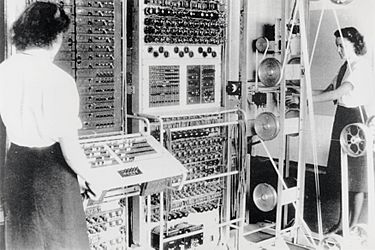Dorothy Du Boisson facts for kids

A Colossus Mark 2 computer being operated by Dorothy Du Boisson (left) and Elsie Booker (right).
|
Dorothy Du Boisson (born November 26, 1919, died February 1, 2013) was a very important person during World War II. She was a code breaker at a secret place called Bletchley Park in England. Her job was to help crack secret enemy messages.
Contents
Working at Bletchley Park
Dorothy Du Boisson joined the Women's Royal Naval Service (WRNS) during World War II. She was sent to the Newmanry section at Bletchley Park in England. Here, she worked with others to operate special code-breaking machines.
Operating Code-Breaking Machines
Dorothy was one of only four people who operated the Tunny machine. To do her job well, she also learned how to use another machine called Heath Robinson. These machines helped to break secret codes. Later, when the powerful Colossus computer was ready, she operated it under the guidance of a cryptographer. A cryptographer is someone who studies and solves secret codes.
Life as a Registrar
As more WRNS members arrived, Dorothy changed roles. She became a registrar in the Ops Rooms. Her job was to keep track of the special tapes used by the machines. She logged them in and out and made sure they went to the right machine.
Dorothy had a lot of work to do because only two people worked in the Ops room. She recorded the date and details of every tape used on the Colossus and Tunny machines. She always knew where each tape was and how long it had been used.
Making Tapes Stronger
Dorothy was also in charge of preparing the tapes for the machines. This meant unwinding them into buckets and then joining them into a loop. This was a very important step. The tapes had to be strong enough to handle the fast speed of the machines. After trying different things, Dorothy found a special way to make the tapes stronger. She used a unique glue, a warm clamp, and a special powder called French chalk.
After the war ended, the code-breaking machines were taken apart. Dorothy later worked as a typist for the Air Ministry.
Tough Working Conditions
The people working at Bletchley Park had to follow strict rules and work very long hours. They often worked up to 70 hours a week! This was because many machines ran all the time, and only a few people knew how to operate them. Workers often had to do three eight-hour shifts every day for many weeks.
The work was very stressful, and mistakes sometimes happened. Because of how the machines worked, if a mistake was found, they often had to start the work all over again.
Living Conditions
Workers spent most of their time inside rooms that didn't have much fresh air or light. Many employees even lived at Bletchley Park, often in attics that were not really set up for living. These attics were cold and damp. Workers sometimes put newspapers in their beds to try and stay warm.
The old buildings and the many electrical cables from the machines could be dangerous, and fires were common. Also, the food was not very good, and sometimes the water was not clean. Workers faced very tough conditions.
The Secret Work and Its Impact
Most of the people at Bletchley Park, including Dorothy, did not know what they were truly doing or how their work was being used. They were told to simply follow orders. They were not allowed to ask questions or talk about their work.
Like other WRNS members, Dorothy knew little about how successful Bletchley Park was at breaking codes. They only got small updates about their impact once a month. They also helped collect important information for the war effort. For example, they kept a card for every German officer. Each time an officer's name appeared in a secret message, all the details were written down. Once, they found a coded message from a German officer asking for his mistress's luggage to be sent to him. This was exciting because they hadn't heard from his army group for several months!
A Huge Contribution
Thomas Flowers, the engineer who designed the Colossus computer, said that Bletchley Park changed history. He praised the code-breakers, but also wanted to recognize the many people who worked incredibly hard to build and get Colossus ready.
Dorothy Du Boisson and the other WRNS girls worked tirelessly. Without their hard work, the Colossus would not have been able to function properly. The first fully working Colossus machine was ready before D-Day, a very important day in the war. This was not by chance. They worked non-stop for four months to meet the deadline. The code-breaking at Bletchley Park helped make sure that the Germans could not stop the American troops from landing on D-Day. General Eisenhower, a very important military leader, said that without the information from Bletchley Park, the war would have lasted at least two years longer.
Later Life
Dorothy Du Boisson passed away on February 1, 2013, after suffering an infection.

